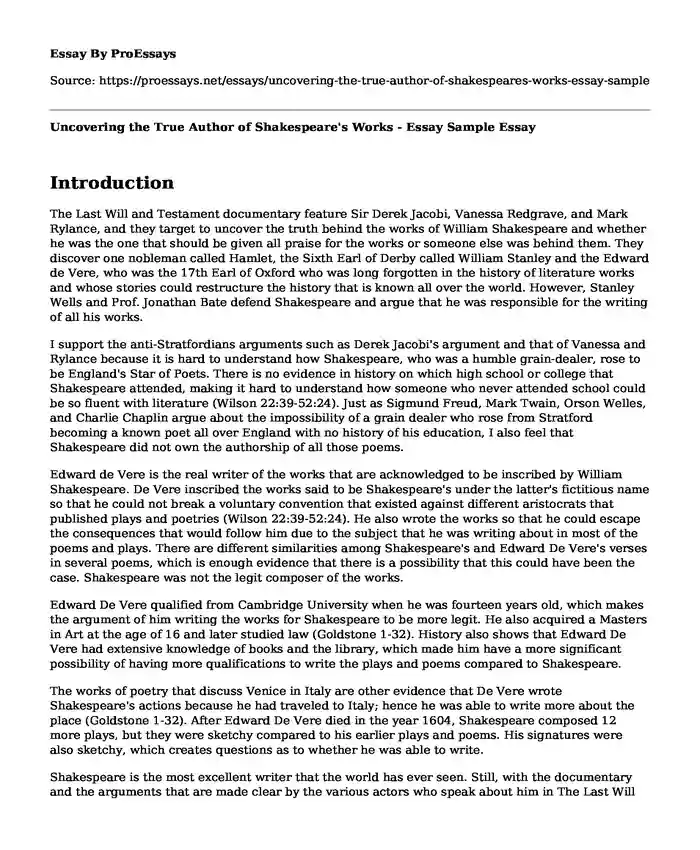Introduction
The Last Will and Testament documentary feature Sir Derek Jacobi, Vanessa Redgrave, and Mark Rylance, and they target to uncover the truth behind the works of William Shakespeare and whether he was the one that should be given all praise for the works or someone else was behind them. They discover one nobleman called Hamlet, the Sixth Earl of Derby called William Stanley and the Edward de Vere, who was the 17th Earl of Oxford who was long forgotten in the history of literature works and whose stories could restructure the history that is known all over the world. However, Stanley Wells and Prof. Jonathan Bate defend Shakespeare and argue that he was responsible for the writing of all his works.
I support the anti-Stratfordians arguments such as Derek Jacobi's argument and that of Vanessa and Rylance because it is hard to understand how Shakespeare, who was a humble grain-dealer, rose to be England's Star of Poets. There is no evidence in history on which high school or college that Shakespeare attended, making it hard to understand how someone who never attended school could be so fluent with literature (Wilson 22:39-52:24). Just as Sigmund Freud, Mark Twain, Orson Welles, and Charlie Chaplin argue about the impossibility of a grain dealer who rose from Stratford becoming a known poet all over England with no history of his education, I also feel that Shakespeare did not own the authorship of all those poems.
Edward de Vere is the real writer of the works that are acknowledged to be inscribed by William Shakespeare. De Vere inscribed the works said to be Shakespeare's under the latter's fictitious name so that he could not break a voluntary convention that existed against different aristocrats that published plays and poetries (Wilson 22:39-52:24). He also wrote the works so that he could escape the consequences that would follow him due to the subject that he was writing about in most of the poems and plays. There are different similarities among Shakespeare's and Edward De Vere's verses in several poems, which is enough evidence that there is a possibility that this could have been the case. Shakespeare was not the legit composer of the works.
Edward De Vere qualified from Cambridge University when he was fourteen years old, which makes the argument of him writing the works for Shakespeare to be more legit. He also acquired a Masters in Art at the age of 16 and later studied law (Goldstone 1-32). History also shows that Edward De Vere had extensive knowledge of books and the library, which made him have a more significant possibility of having more qualifications to write the plays and poems compared to Shakespeare.
The works of poetry that discuss Venice in Italy are other evidence that De Vere wrote Shakespeare's actions because he had traveled to Italy; hence he was able to write more about the place (Goldstone 1-32). After Edward De Vere died in the year 1604, Shakespeare composed 12 more plays, but they were sketchy compared to his earlier plays and poems. His signatures were also sketchy, which creates questions as to whether he was able to write.
Shakespeare is the most excellent writer that the world has ever seen. Still, with the documentary and the arguments that are made clear by the various actors who speak about him in The Last Will and Testament, it is correct to argue that the 17th Earl of Oxford could have written the plays and poems for Shakespeare in fear of the actions that other aristocrats would have taken against him.
Works Cited
Goldstone, Jack A. "The Latin Inscription on the Stratford Shakespeare Monument Unraveled: It's Bearing on the Stratfordian Controversy." Shakespeare Oxford Fellowship, 2012, https://shakespeareoxfordfellowship.org/wp-content/uploads/2013/08/SM11.2.pdf 1-32
Wilson, Lisa. Last Will & Testament, 2012, therokuchannel.roku.com/watch/1eb4be676c9b55cab8952d7d6ee26e5c.
Cite this page
Uncovering the True Author of Shakespeare's Works - Essay Sample. (2023, Apr 28). Retrieved from https://proessays.net/essays/uncovering-the-true-author-of-shakespeares-works-essay-sample
If you are the original author of this essay and no longer wish to have it published on the ProEssays website, please click below to request its removal:
- Annotated Bibliography on American Dream and Identity Issues
- Diagnosing Abigail Williams in Crucible by Arthur Miller
- Compare and Contrast Essay: Gloucester Cathedral and Temple of Bacchus
- The Human Person by Bransfield Analysis Paper Example
- Movie Analysis Essay on Bram Stoker's Dracula
- Emily Dickinson: A Positive Romantic Poet - Essay Sample
- Essay Example on Hatred and Racism in Othello: An Unanswered Question







